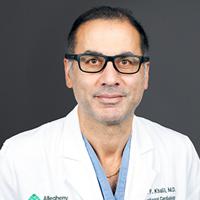TAVR at AHN: Advancing Structural Heart Disease Treatment Through Expert Care and Research

Aortic valve stenosis affects nearly 4% of people ages 70–75 and 10% of those over the age of 85.* Without treatment, severe cases carry a 50% mortality rate within two to three years.**
AHN Cardiovascular Institute is proud to provide life-saving care for patients with heart disease through TAVR (transcatheter aortic valve replacement), and to pioneer critical research shaping the future of the procedure.
A minimally invasive approach to aortic valve replacement
TAVR is a minimally invasive, catheter-based procedure that involves replacing a diseased aortic valve without the need for open-heart surgery. The procedure is typically performed via transfemoral access or an alternative vascular access route.
Compared to surgical aortic valve replacement (SAVR), TAVR offers benefits like:
- No need for sternotomy or cardiopulmonary bypass
- Shorter hospital stays
- Less postoperative pain and scarring
- Lower risk of infection and complications
- Shorter recovery time
AHN was an early regional leader in TAVR adoption. AHN Allegheny General Hospital (AGH) was the only medical center in the region to participate in pivotal FDA trials for high-risk and, later, low-risk patient populations. Today, heart valve specialists across the network at AGH, Forbes Hospital, Jefferson Hospital and Saint Vincent Hospital are nationally recognized for their expertise in TAVR procedures.
Collaboration is key
From diagnosis through recovery, AHN’s structural heart program follows a team-based, coordinated care model involving:
- Interventional cardiologists
- Cardiac surgeons
- Echocardiographers
- Radiologists
- Nurse navigators
“Many TAVR patients are living longer after intervention, which means we must consider how to optimize outcomes not just now, but 10–15 years in the future,” said AHN interventional cardiologist, Ramzi Khalil, MD. “That’s why collaboration across disciplines is key to personalized, forward-thinking care planning.”
Pioneering research at AHN Allegheny General Hospital
AGH was the top U.S. enrollment site for the SMART Trial (Small Annuli Randomized to Evolut or SAPIEN) — a landmark international clinical trial comparing self-expanding and balloon-expanding valves in patients with aortic stenosis and small aortic annuli.
The study, reported in the New England Journal of Medicine in 2024, found that self-expanding valves demonstrated superior one-year hemodynamic performance with improved outcomes for valve dysfunction, residual gradient, and patient prosthesis mismatch. Both valve types showed similar rates of stroke, heart failure readmission, and mortality.
Long term follow-up on study participants is expected to provide insights that shape best practices for valve selection and future procedural planning globally.
“As heart disease continues to become more prevalent, studies like SMART are essential to refining treatment and extending quality of life,” said Dr. Khalil, co-principal of the study. “AHN is proud to be at the forefront of this progress.”
AGH is also pioneering two additional clinical trials including the PROGRESS trial to evaluate whether early intervention can prevent hospitalizations and improve survival in patients with symptomatic moderate aortic stenosis, and ALIGN-AR, which monitors the effectiveness of the JenaValve TrilogyTM Heart Valve System in high-risk patients with severe aortic regurgitation. AGH is one of only two sites in Pennsylvania recruiting for the ongoing ALIGN-AR trial.
How to refer
If your patient presents with symptoms of aortic valve disease or has abnormal scan results, heart specialists at AHN Center for Aortic Disease are available to evaluate for TAVR candidacy and guide next steps in their care plan. For more information or to make a referral, call 412-442-7650 to speak to Aortic Coordinator, Kileigh Barnes, BSN, RN.
Source: Diagnosis and Management of Aortic Valvular Disease in the Elderly. NIH.gov
Source: Redefining Risk Discussions: Explaining Risk To Patients With Severe Aortic Stenosis. American College of Cardiology.
About Ramzi Khalil MD
Ramzi F. Khalil, MD is an interventional cardiologist with AHN Cardiovascular Institute, skilled at cardiac catheterization, coronary angioplasty, and carotid artery stent. He provides patient-centered care for structural heart disease and peripheral artery disease. Dr. Khalil went to medical School at American University of Beirut School of Medicine in Beirut, Lebanon. He did his residency at Cleveland Clinic in Cleveland, Ohio and his fellowship in cardiology and interventional cardiology at AHN General Hospital and AHN West Penn Hospital in Pittsburgh, Pennsylvania. He is certified by the American Board of Internal Medicine in Cardiovascular Disease and Interventional Cardiology.
At AHN Cardiovascular Institute, our renowned cardiologists, surgeons, and heart specialists are committed to keeping your heart beating longer and stronger. Our specialists focus on providing expert care for conditions like heart attack and heart failure, as well as preventive medicine to keep you healthy.


